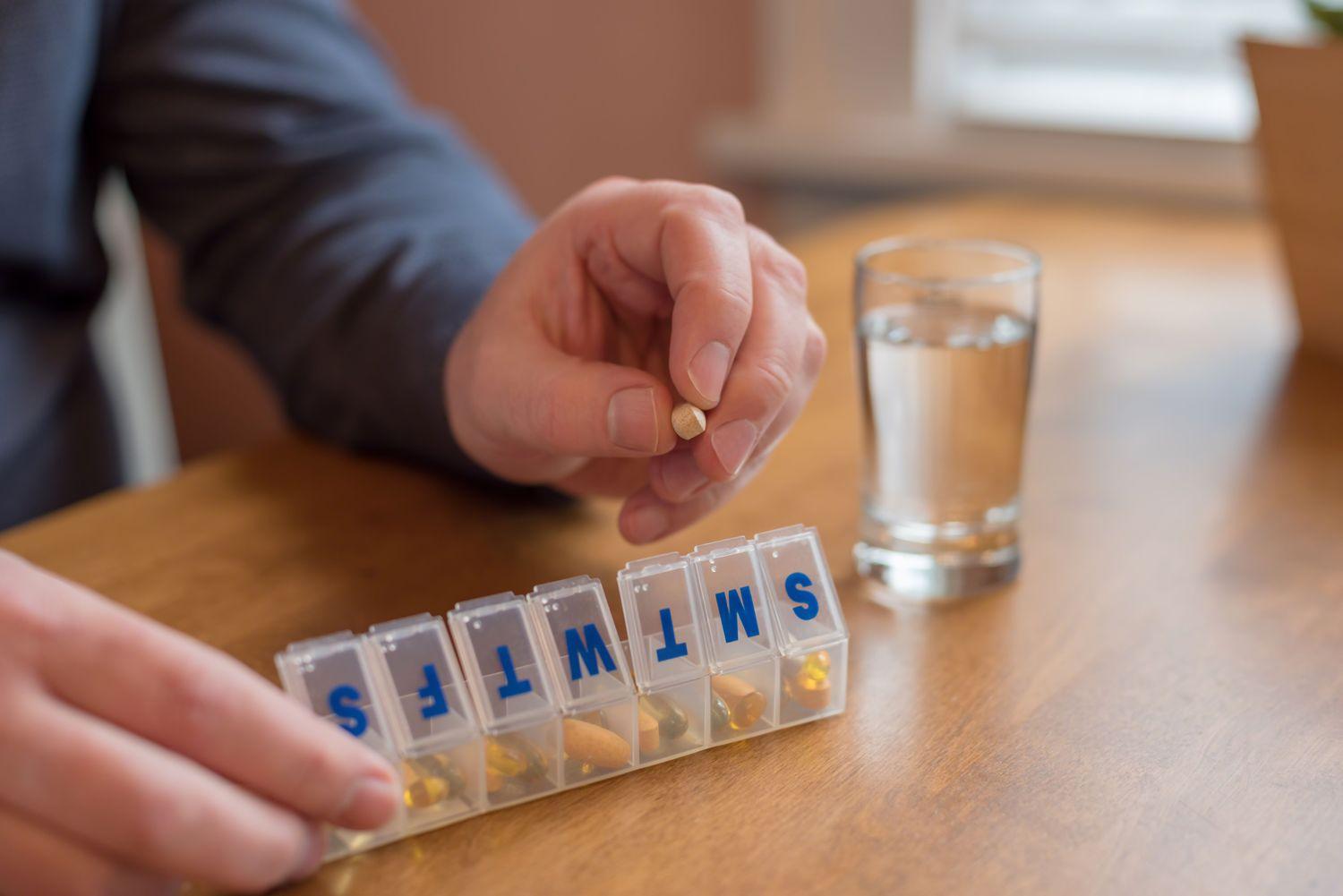Searching shows that many older adults who had a fallen wound who currently took at least one "risk risk -contant money".
7 Medications That May Increase Fall Risk in Older Adults By Fran Kritz Published on September 23, 2025 Medically reviewed by Aviv Joshua, MS, RDN Rising use of some prescription drugs may be leading to more fall-related injuries in older adults. Kristen Prahl / Getty Images Falls are a leading cause of injury and death in older adults, and research suggests that prescription drugs such as opioids and antidepressants may be fueling the trend. A research review published in JAMA warns that the rising use of medications that impair balance or cause drowsiness may be contributing to a surge in fall-related deaths. Studies show that 65%-93% of the older adults who had a fall-related injury took at least one "fall risk-increasing drug" (FRID) at the time. What Are 'Fall Risk-Increasing Drugs'? Drugs that get labeled as "fall risk-increasing" typically affect the central nervous system, such as opioids and antidepressants. They may cause drowsiness and loss of balance. The risk depends both on the drug's side effects and the health of the person taking it. “Someone may become drowsy but also not have the strength to avoid a fall,” said Nicole Brandt, PharmD, chair of geriatric pharmacotherapy at the University of Maryland School of Pharmacy. Brandt added that taking multiple drugs that affect the brain, especially with alcohol or marijuana, can further increase fall risk. “Not every medication in a category necessarily poses a fall risk for every person,” she said. “But it’s worth asking your doctor about all the medicines you take, especially if any fall into the categories below.” 1. Antidepressants Examples: Cymbalta (duloxetine), Elavil (amitriptyline), and Paxil (paroxetine) These medications may impair balance and coordination, cause a sudden drop in blood pressure, cause drowsiness and dizziness, putting you at risk of a fall. 2. Anticonvulsants Examples: gabapentin Anticonvulsants are used to prevent or control seizures, sometimes to relieve pain. However, they pose a fall risk because they can cause dizziness, sedation, confusion, and unsteadiness. 3. Blood Pressure-Lowering Medications Examples: Norvasc (amlodipine) and HCTZ (hydrochlorothiazide) Antihypertensives are used to reduce blood pressure, but they could cause “orthostatic hypotension,” a sudden drop in blood pressure when changing body positions, like standing up suddenly. Some of the drugs can also cause dizziness and tiredness. 4. Anti-Anxiety Medications Examples: Ativan (lorazepam) and Xanax (alprazolam) Benzodiazepines can be used to treat anxiety. They can cause sedation, impaired balance, slowed reaction times, and dizziness. 5. Opioids Examples: oxycodone and morphine Opioids can lead to sedation. They can also cause a drop in blood pressure, which can cause fainting. Some opioids can also cause a drop in sodium levels, which can increase dizziness and confusion. 6. Antispasmodics Examples: Bentyl (dicyclomine) and Detrol (tolterodine) Antispasmodics can be used to help relieve abdominal pain related to muscle cramps in your digestive system or urinary system, or to reduce excessive urges to go to the bathroom. They can increase fall risk by impairing balance, coordination, and mental alertness. 7. Older Antihistamines Examples: Tylenol PM, Benadryl (diphenhydramine), and Chlor-Trimeton (chlorpheniramine) Older-generation antihistamines such as Benadryl can cause drowsiness. Some over-the-counter cold medicines may also include the same active ingredient, diphenhydramine. You can switch to newer antihistamines such as Zyrtec (cetirizine) and Claritin (loratadine) to reduce the likelihood of drowsiness. 'Deprescribing' Drugs for Older Adults Reducing unnecessary medication use could help reduce the risk of falls. Some experts advocate for "deprescribing," a process where healthcare providers work with patients to taper or discontinue drugs that are no longer beneficial or needed. “But patients don’t have to wait for their doctor. They should initiate that conversation," said Jeffrey Kullgren, MD, an associate professor of internal medicine at the University of Michigan School of Public Health who has written about deprescribing. Discussing medications that raise fall risk may lead a doctor to adjust the dose, switch the drug, or stop it altogether. Still, Kullgren noted, some drugs remain necessary despite the risk. In those cases, doctors work with patients and caregivers to lower the chance of falls. For example, they may recommend nighttime dosing, standing up slowly, or using a cane. “Don’t stop taking a drug on your own without first talking to your doctor,” Kullgren said. Read more: Prevention & Treatment Drugs 12 Sources Verywell Health uses only high-quality sources, including peer-reviewed studies, to support the facts within our articles. Read our editorial process to learn more about how we fact-check and keep our content accurate, reliable, and trustworthy. Centers for Disease Control and Prevention. Older adult falls data. Hart LA, Phelan EA, Yi JY, Marcum ZA, Gray SL. Use of fall risk-increasing drugs around a fall-related injury in older adults: a systematic review. J Am Geriatr Soc. 2020;68(6):1334-1343. doi:10.1111/jgs.16369 de Godoi Rezende Costa Molino C, Forster CK, Wieczorek M, et al. Association of fall risk-increasing drugs with falls in generally healthy older adults: a 3-year prospective observational study of the DO-HEALTH trial. BMC Geriatr. 2024;24(1):980. doi:10.1186/s12877-024-05557-2 Jung YS, Suh D, Choi HS, Park HD, Jung SY, Suh DC. Risk of fall-related injuries associated with antidepressant use in elderly patients: a nationwide matched cohort study. Int J Environ Res Public Health. 2022;19(4):2298. doi:10.3390/ijerph19042298 Rivasi G, Rafanelli M, Mossello E, Brignole M, Ungar A. Drug-related orthostatic hypotension: beyond anti-hypertensive medications. Drugs Aging. 2020;37(10):725-738. doi:10.1007/s40266-020-00796-5 Leung MTY, Turner JP, Marquina C, et al. Gabapentinoids and risk of hip fracture. JAMA Netw Open. 2024;7(11):e2444488. doi:10.1001/jamanetworkopen.2024.44488 Raber I, Belanger MJ, Farahmand R, et al. Orthostatic hypotension in hypertensive adults: Harry Goldblatt Award for Early Career Investigators 2021. Hypertension. 2022;79(11):2388-2396. doi:10.1161/HYPERTENSIONAHA.122.18557 Edinoff AN, Nix CA, Hollier J, et al. Benzodiazepines: uses, dangers, and clinical considerations. Neurol Int. 2021;13(4):594-607. doi:10.3390/neurolint13040059 Virnes RE, Tiihonen M, Karttunen N, van Poelgeest EP, van der Velde N, Hartikainen S. Opioids and falls risk in older adults: a narrative review. Drugs Aging. 2022;39(3):199-207. doi:10.1007/s40266-022-00929-y Harvard Health Publishing. Medications that increase your risk of falling. MedlinePlus. Dicyclomine. Thompson W, Farrell B. Deprescribing: what is it and what does the evidence tell us?. Can J Hosp Pharm. 2013;66(3):201-202. doi:10.4212/cjhp.v66i3.1261 By Fran Kritz Kritz is a healthcare reporter with a focus on health policy. She is a former staff writer for U.S. News and World Report. See Our Editorial Process Meet Our Medical Expert Board Share Feedback Was this page helpful? Thanks for your feedback! What is your feedback? Helpful Report an Error Other Submit








